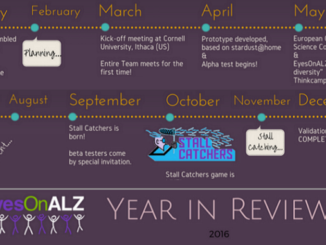
Addictive online games make citizen science a hit
Ladan Cockshut, Durham University
A few days ago, I was an astrophysicist and contributed to a research project by organising sunspot images in order of complexity. After I’d had enough of that, I became a biochemist and worked late into the night on a project creating synthetic RNA.
Actually, I am not a scientist. Before yesterday I hadn’t really studied sunspots and I am still not entirely sure what RNA does. And yet, I was welcomed by the research team. It turns out they didn’t care about my lack of scientific knowledge. What they needed were my visual and gaming skills.
Both these projects, Sunspotter and EteRNA, exemplify the recent upswing in citizen science projects. Sunspotter’s aim is to track sun spots, which can inform us about solar storms that have the capacity to be quite destructive. EteRNA’s aim is to learn more about manipulating RNA – one of the basic molecules of life – which can then help in nanoengineering new types of proteins that can create useful chemicals or perform desired actions inside the body.
Citizen science has been widely applauded by those involved in and watching its progress. Many view them as providing reliable data and solving problems effectively. But even though there are more citizen science projects than ever before, this is not a new concept. There has been a long tradition of the public contributing to research – the Audubon Society’s “Christmas Bird Count” first launched in 1900 – though they have been typically limited to collecting and submitting data.
Nowadays citizen science also engages volunteers in human-based computing. While advances in computing have enhanced research, computers can only do so much. In an interview, Rhiju Das, a biochemist at Stanford University and co-creator of EteRNA, explained that while computing programs try to decipher and build new strands of RNA, none can match the human ability to pick up on “subtle, emerging patterns” to effectively predict new ones.
Leaving all human-based computing in the hands of highly trained scientists or technicians alone, however, could cripple progress. In a bid to address this, some scientists are cross-breeding citizen science with digital games to facilitate human-based computing in an entertaining way. And it seems to be working.
Gamifying citizen science
Scientists such as Das find gamification an effective method of human-based computing. He claims the addictive, social and goals-based elements of a game keep enthusiasts coming back and contributing. And having this large group engaged with human-based computing is critical to generating enough data to spring the research forward.
I can certainly see those elements while exploring EteRNA. It is an online game portal with simple game features. Its elements remind me of other successful, conventional online games that I study, such as the World of Warcraft. It has achievements and rankings. The goals are clear. And there is a forum and chat function.
The players have come up with guides and tutorials. When I solve a puzzle, my screen rewards me with a shimmering display of lights and bubbles. While a lot of people have tried the game – more than 60,000 accounts have been created – far fewer appear to have spent more than a few tries at the puzzles. It is not impossible, but there is a learning curve.
So rather than just visually comparing images, like in the Sunspotter project, a citizen science game is designed to generate results or content in a way that is entertaining and relies on the core elements of a game itself. That is to say, while the citizen science outcome is clearly stated – “you will help us fold proteins” – gamifying the activity transforms this outcome into – “you will compete against each other to see who is the fastest or best at folding proteins”. And if you do well there are rewards: rankings, access to the scientists and the chance to make a real contribution to scientific research. This is exactly what massive multi-player online games, or MMOGA, depend on for long-term success.

Protein folding.Emw, CC BY
Advantages of addiction
Eli Fisker has been playing EteRNA since 2011 and is currently ranked 5th amongst EteRNA gamers. What brought Eli to EteRNA was his love of puzzle games, such as Tetris or Candy Crush, and an interest in science. He is quick to point out that while he is not a scientist – he is a librarian, actually – being a citizen scientist lets him add meaning to his love of science.
“There a lot of regular people interested in science,” he told me. “So it is great that this love for science can be used for good. We get a shot at helping solve scientific problems.”
A citizen-science game has an added benefit: by using a game format for human-based computing activity, a gamer like Eli can feel like he has helped speed up scientific research. A feeling he claims is more “addictive than Candy Crush”, which is a highly addictive and successful smartphone game.
Citizen science is not without its controversies, however. Some question the ethics of the long hours put in by unpaid volunteers. The fact also remains that little research has been published so far around the wider impact of these games, particularly when exploring issues like failure, research impact or the player experience.
A lack of participation can also affect the effectiveness of these games. Adrien Trueille, EteRNA’s other co-creator and computer scientist at Carnegie Mellon University, noted that the game’s research aim may be unachievable without enough volunteers, particularly if it is dependent on human-generated design and analysis.
And yet, the rise of these types of games suggests a fascination with the idea of citizen science games. It is unclear if that is due to everything being gamified these days or because scientists are seeing it as a great way to attract wider participation and impact. Regardless, those who play these games seem happy to keep working on the problems their scientific colleagues put forward.
“My feeling about citizen science is empowerment,” Eli said. “We play, fail and succeed. I can do something concrete about a specific problem.”
![]()
Ladan Cockshut, Postdoctoral Research Associate in Cybersecurity and Digital Technologies, Durham University
This article was originally published on The Conversation. Read the original article.


